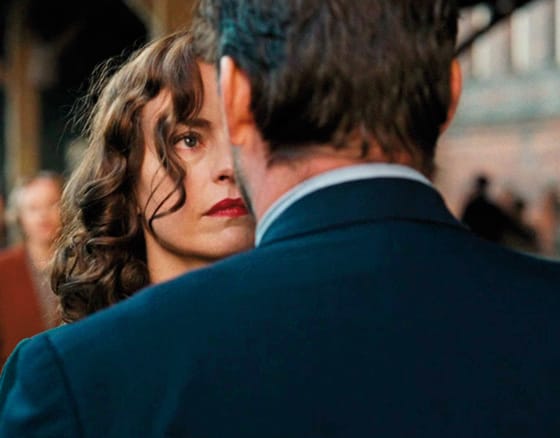Christian Petzold's follow-up to the internationally acclaimed period drama, Barbara, is quite similar to its predecessor. Nelly Lenz (Nina Hoss), much like Barbara (also Hoss), is expelled from her German homeland in turbulent political times. Where Barbara tackled notions of German identity in the '80s — before the fall of the Berlin Wall — Phoenix jumps back to post-WWII Berlin to expound on some additional insights about the era and what it means to confront betrayal and reconstruction.
In order to tell the story he wants, Petzold makes one highly incredulous and arguably flawed concession: Nelly, while having survived the concentration camps, has been terribly disfigured. Reconstructive surgery makes her look like a distant facsimile of herself, like a cousin or a sibling. This means that when she runs into her husband Johnny (Ronald Zehrfeld), he doesn't recognize her as his wife. What's worse is that he asks her to impersonate his presumably dead wife so he can get his hands on her inheritance.
This setup is difficult to accept. It does help by giving Phoenix a fantastical quality that heightens the fable aspects of the story, but the otherwise realist sensibilities and commitment to historical responsibility contradicts this in a way. If accepted as metaphor, however, the basic premise allows for a rather complex and quietly tense exercise in narrative restraint. Nelly plays along with Johnny's scheme, constantly wondering — much as we are — if he secretly knows the truth or, more importantly, if he was the one that gave her up to the Nazis in the first place.
Since most of the film revolves around these discomforting exchanges, with Johnny training Nelly to be more like her old self, Hoss and Zehrfeld are given a lot of room to interpret their characters and perform a wide range of subdued emotions. Hoss, in particular, exploits this, delivering an exceedingly layered and fascinating performance of a woman struggling to trust a man she's uncertain of while coping with what it means to return to a place that is forever scarred. At its core, Phoenix is as much about Nelly's inability to revert to her previous self after suffering tragedy as it is about the wide cultural inability to do so.
Amidst the mostly empty streets and general lack of animation and excitement, there's a persisting sense of grief permeating every aspect of Berlin. Even the titular club has a hollow feeling about it; going through the motions despite never really capturing the sense of escapist whimsy that such a locale should embody. This tone and the sparse, isolated dynamic of Phoenix is a consistency in Petzold's films. He has an uncanny ability to exploit geography while simultaneously making it fade away in favour of the unspoken tensions that make his deceptively simple works so rich.
Since Barbara already covered similar ideas with the same basic structure, it would be easy to overlook Phoenix for the accomplishment it is. But in the final moments, when a single song and a couple of glances speak multitudes, it's clear that Petzold has carefully considered every moment leading up to them.
(Films We Like)In order to tell the story he wants, Petzold makes one highly incredulous and arguably flawed concession: Nelly, while having survived the concentration camps, has been terribly disfigured. Reconstructive surgery makes her look like a distant facsimile of herself, like a cousin or a sibling. This means that when she runs into her husband Johnny (Ronald Zehrfeld), he doesn't recognize her as his wife. What's worse is that he asks her to impersonate his presumably dead wife so he can get his hands on her inheritance.
This setup is difficult to accept. It does help by giving Phoenix a fantastical quality that heightens the fable aspects of the story, but the otherwise realist sensibilities and commitment to historical responsibility contradicts this in a way. If accepted as metaphor, however, the basic premise allows for a rather complex and quietly tense exercise in narrative restraint. Nelly plays along with Johnny's scheme, constantly wondering — much as we are — if he secretly knows the truth or, more importantly, if he was the one that gave her up to the Nazis in the first place.
Since most of the film revolves around these discomforting exchanges, with Johnny training Nelly to be more like her old self, Hoss and Zehrfeld are given a lot of room to interpret their characters and perform a wide range of subdued emotions. Hoss, in particular, exploits this, delivering an exceedingly layered and fascinating performance of a woman struggling to trust a man she's uncertain of while coping with what it means to return to a place that is forever scarred. At its core, Phoenix is as much about Nelly's inability to revert to her previous self after suffering tragedy as it is about the wide cultural inability to do so.
Amidst the mostly empty streets and general lack of animation and excitement, there's a persisting sense of grief permeating every aspect of Berlin. Even the titular club has a hollow feeling about it; going through the motions despite never really capturing the sense of escapist whimsy that such a locale should embody. This tone and the sparse, isolated dynamic of Phoenix is a consistency in Petzold's films. He has an uncanny ability to exploit geography while simultaneously making it fade away in favour of the unspoken tensions that make his deceptively simple works so rich.
Since Barbara already covered similar ideas with the same basic structure, it would be easy to overlook Phoenix for the accomplishment it is. But in the final moments, when a single song and a couple of glances speak multitudes, it's clear that Petzold has carefully considered every moment leading up to them.




